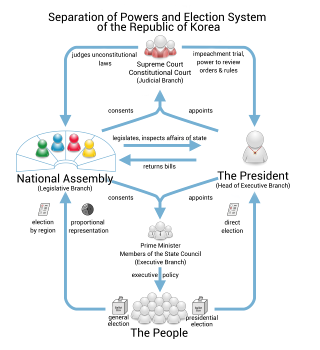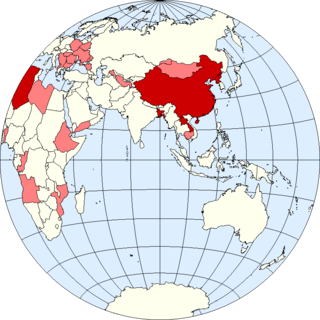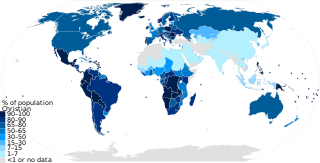
The World Factbook, also known as the CIA World Factbook, is a reference resource produced by the Central Intelligence Agency (CIA) with almanac-style information about the countries of the world. The official print version is available from the Government Publishing Office. The Factbook is available in the form of a website that is partially updated every week. It is also available for download for use off-line. It provides a two- to three-page summary of the demographics, geography, communications, government, economy, and military of 266 international entities, including U.S.-recognized countries, dependencies, and other areas in the world.

The politics of South Korea take place in the framework of a presidential representative democratic republic, whereby the president is the head of state, and of a multi-party system. To ensure a separation of powers, the Republic of Korea Government is made up of three branches: legislative, executive, and judicial. The government exercises executive power and legislative power is vested in both the government and the National Assembly. The judiciary is independent of the executive and the legislature and comprises a Supreme Court, appellate courts, and a Constitutional Court.
A federal republic is a federation of states with a republican form of government. At its core, the literal meaning of the word republic when used to reference a form of government means: "a country that is governed by elected representatives and by an elected leader rather than by a monarch".

People's republic is an official title that is mostly used by current and former communist states, as well as other left-wing governments. It is mainly associated with soviet republics, socialist states following the doctrine of people's democracy, sovereign states with a democratic-republican constitution that usually mentions socialism, as well as some countries that do not fit into any of these categories.

Central Africa is a subregion of the African continent comprising various countries according to different definitions. Middle Africa is an analogous term used by the United Nations in its geoscheme for Africa and consists of the following countries: Angola, Burundi, Cameroon, Central African Republic, Chad, Democratic Republic of the Congo, Republic of the Congo, Equatorial Guinea, Gabon, Rwanda, and São Tomé and Príncipe. These eleven countries are members of the Economic Community of Central African States (ECCAS). Six of those countries are also members of the Economic and Monetary Community of Central Africa (CEMAC) and share a common currency, the Central African CFA franc.
Religion in Africa is multifaceted and has been a major influence on art, culture and philosophy. Today, the continent's various populations and individuals are mostly adherents of Christianity, Islam, and to a lesser extent several traditional African religions. In Christian or Islamic communities, religious beliefs are also sometimes characterized with syncretism with the beliefs and practices of traditional religions.

As of the year 2021, Christianity had approximately 2.38 billion adherents and is the largest religion by population respectively. According to a PEW estimation in 2020, Christians made up to 2.38 billion of the worldwide population of about 8 billion people. It represents nearly one-third of the world's population and is the largest religion in the world, with the three largest groups of Christians being the Catholic Church, Protestantism, and the Eastern Orthodox Church. The largest Christian denomination is the Catholic Church, with 1.3 billion baptized members. The second largest Christian branch is either Protestantism, or the Eastern Orthodox Church.
The following are the international rankings of Taiwan.

The ancestral population of modern Asian people has its origins in the two primary prehistoric settlement centres – greater Southwest Asia and from the Mongolian plateau towards Northern China.

The Transitional Government of Ethiopia (TGE) was an era established immediately after the Ethiopian People's Revolutionary Democratic Front (EPRDF) seized power from the Marxist-Leninist People's Democratic Republic of Ethiopia (PDRE) in 1991. During the transitional period, Meles Zenawi served as the president of the TGE while Tamrat Layne was prime minister. Among other major shifts in the country's political institutions, it was under the authority of the TGE that the realignment of provincial boundaries on the basis of ethnolinguistic identity occurred. The TGE was in power until 1995, when it transitioned into the reconstituted Federal Democratic Republic of Ethiopia that remains today.
Monoethnicity is the existence of a single ethnic group in a given region or country. It is the opposite of polyethnicity.

Adherents of Islam constitute the world's second largest religious group. A projection by the PEW suggests that Muslims numbered approximately 1.9 billion followers in 2020. Studies in the 21st century suggest that, in terms of percentage and worldwide spread, Islam is the fastest-growing major religion in the world, mostly because Muslims have more children than other major religious groups. Most Muslims are either of two denominations: Sunni or Shia. Islam is the majority religion in several subregions: Central Asia, Western Asia, North Africa, West Africa, the Sahel, and the Middle East. The diverse Asia-Pacific region contains the highest number of Muslims in the world, easily surpassing the combined Middle East and North Africa.
Africa, the world's second-largest and second-most populous continent, spans across six different time zone offsets from Coordinated Universal Time (UTC): UTC−01:00 to UTC+04:00. As Africa straddles the equator and tropics, there is little change in daylight hours throughout the year and as such daylight saving time is currently observed in only one country, Morocco, however it was also previously observed in several other countries.







